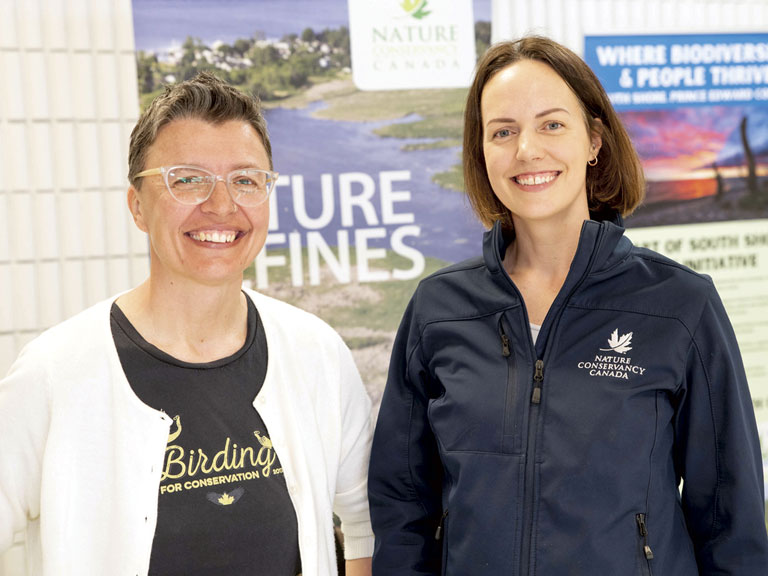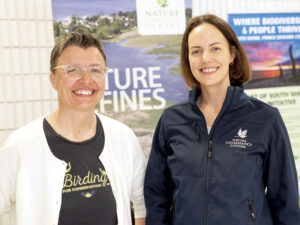County News
County Environmental Expo

Mitigation and adaptation in the face of a changing climate
The County of Prince Edward, in partnership with a number of community organizations, held its second annual Environmental Expo last Saturday at the Prince Edward Community Centre in Picton. The day-long event featured workshops and discussion panels about climate adaptation, mitigation of climate change, and environmental protection and sustainability. Visitors also had the opportunity to test drive an electric or hybrid vehicle, provided by Plug’N’- Drive. The event was organized by the County’s Environmental Advisory Committee (EAC). “It is intended to help educate and inform people of what they can do. We all share the same environment and we want to slow down and adapt to the impact of climate change in the County,” said EAC member Cathie Coultis.

L-R): Ewa Bednarczuk and Jennifer Gagné at the County’s second annual Environmental Expo.
The morning opened with a panel discussion about trees, titled Tree Talk. Ewa Bednarczuk, Conservation Biology Coordinator in the Rice Lake Plains with the Nature Conservancy of Canada, engaged in a conversation with Jennifer Gagné, Coordinator and Conservation Biologist with Nature Conservancy Canada. They noted that the County has a variety of ecosystems from alvar to wetlands to forests, as well as the human-changed landscape. In terms of trees, the County’s ash trees have almost all died off as a result of the emerald ash borer, and trees such as the American chestnut and butternut are in serious decline. Ms. Gagné said that pre-emptively cutting down diseased trees can have a negative impact as it doesn’t allow for natural resistance develop. There are some types of ash trees (known as lingering ash) that appear to survive the depredations of the emerald ash borer and could eventually result in stronger genetics. When it comes to County residents planting trees, Ms. Gagné says it’s best to choose native species such as oaks, maples or white pines. These trees are part of the natural ecosystem and provide habitat for a variety of species from fungi and insects to birds and mammals. While non-native species of trees can be grown, they typically do not have a relationship to the natural food web. Ms. Bednarczuk said that while trees are a source of carbon sequestration, there is a larger potential in grasslands and wetlands. “There is a huge potential for soil to store carbon. There is a whole ecosystem, and the soil is full of living beings that are part of the ‘poop cycle’. Tall grasses have incredibly deep roots, which also sequester carbon,” she said. The tree talk was followed by a Q&A session. Among the questions was whether dead wood should be cleared out of a forest. Ms. Gagné said it’s best to let the dead wood break down—“It’s a forest, not your living room”—although sometimes prescribed burns are used as a way to prevent devastating forest fires that feed on dead wood in dry conditions. She noted that this year’s tree giveaway will result in over 5,000 new trees being planted in the County.
There were a number of community organizations taking part in the Expo, including the West lake Community Association, Bay of Quinte Remedial Action Plan, the County Garden Club, and Earth Day Canada. Surya Narayan Santhakumar, a Grade Nine student from Eastside Secondary School in Belleville was there with his award-winning Science Fair project called Net Zero Commute. It is a mobile application that will help users make sustainable choices in terms of commuting, leading to reduced carbon emissions and mitigation of climate change. He will be taking his project to the Canada-wide Science Fair in Ottawa next month. Other presentations included sustainable agricultural practices and farmland protection, and the impact of heat pumps on the decarbonization economy. Heat pumps are becoming increasingly popular, but installation costs remain high. That is expected to change as installers gain more experience. Another factor is the demand this technology places on the electrical grid, which will have to become more robust to cope. There was also a discussion panel moderated by Councillor Kate MacNaughton on how the County is dealing with the prospect of climate change. The panel participants were Albert Paschkowiak, Supervisor of Environmental Services and Sustainability, Julianne Snepsts, Community Programs Supervisor, and Arryn McNichol, Director and Green Task Force lead. They discussed how County programs are innovating to become more sustainable and environmentally friendly. Some of those projects include the County transit system, which has the potential to have a positive climate impact as more users take advantage of it, instead of driving their own cars. Other climate initiatives include the use of energy-saving LED street lights, and electric vehicle charging stations. In the longer term, Mr. Mc Nichol said that building a strong foundation including risk and asset management as well as developing partnerships with other municipalities and levels of government will allow the County to advance to a sustainable future.

Comments (0)